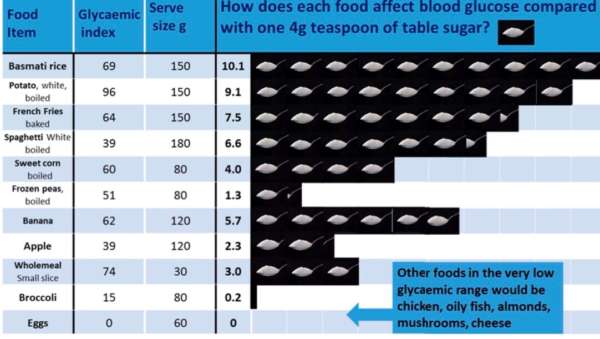Share
Eating sugar sweets may decrease the production of the stress-related hormone glucocorticoid. This hormone has been linked both to obesity and to decreased immune response. Researchers gave adult male rats small amounts of sugar drink, artificially sweetened drink, or water. After two weeks, the rats were given a physical and psychological stress challenge. Rats on the sugar drink regimen produced lower glucocorticoid levels than those that drank either the water or the artificially sweetened beverage.
This inability to produce glucocorticoids under stress is a significant risk for health.
When you eat sugar you eventually drive your insulin and leptin levels up, and this is one of the most potent accelerators of aging and chronic disease. It is the reverse fountain of youth.

Sugar is luring everywhere. This image captures just a few foods. Fruit is high in sugar. A banana is nearly 6 teaspoons of sugar. It is not the sugar itself that is the problem. It is the impact this has on the blood glucose levels.
Simple sugars have been observed to
- aggravate asthma, muster mental illness, move mood swings, provoke personality changes, nourish nervous disorders, hurry heart disease, deliver diabetes, grow gallstones, hasten hypertension, add arthritis, and on top of all of that…It will kill you!
- Certain harmful refined dietary sugars Glucose, Fructose, Sucrose, Galactose, Maltose, and Lactose almost always turn directly into fat! and digested and absorbed with such speed that the body must convert them into saturated fats.
- Saturated Fatty Acids are “sticky” by nature, and, when introduced into the vascular system, clog arteries, increase the chance of stroke, diabetes, and definitively decrease athletic performance.
- High sugar intake affects muscle function and reduces strength.
- Constant high intake of simple dietary sugar over-stimulates or “burns out” normal, healthy pancreas and adrenal function. Sub-normal or lackluster performance of these two important endocrine glands leads directly to adult-onset diabetes, cardiovascular complications, hypoglycemia, and chronic fatigue.
The direct result of high sugar intake is a significant increase in blood serum saturated fatty acids, which depresses the oxygen transport system dramatically during athletic performance. - Because refined dietary sugars lack vitamins and minerals, they must draw upon the body tissue micronutrient stores in order to be metabolized into the system. When these storehouses are depleted, metabolization of fatty acid and cholesterol are impeded, contributing to higher blood serum triglycerides, cholesterol, promoting obesity due to higher fatty acid storage around organs and in subcutaneous tissue folds.
- Increased obesity contributes to increased cholesterol levels by lowering resting metabolism. A lower resting metabolic rate has been implicated directly to feelings of fatigue or lack of energy, increased rate of aging, arthritis, and coronary heart disease.
